
Orchid-hunting in the Burnt Lands
June 23rd, 2017
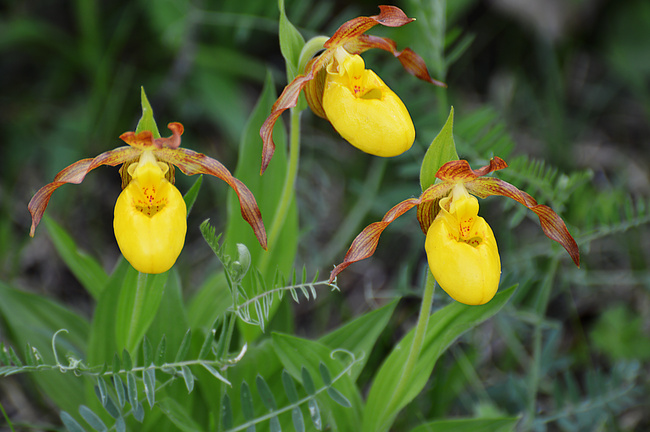
"The Three Sisters", yellow ladyslippers in bloom on the Burnt Lands alvar
In early June I made several trips out to the Burnt Lands near Almonte, hunting for orchids. For being a provincial park, this area is surprisingly unknown and unmarked, but it is an ecological gem. Last August I found it teeming with Aphrodite Fritillaries and other interesting insects (1, 2). I promised myself that for 2017, I'd go earlier in the year and seek out the elusive Ram's Head Ladyslipper, one of the rarest orchids in North America.
Last summer my usual access to the park was via Ramsey Concession 12. The maintained road ends and turns into a dirt road through the park. I found it quite hikable with only the occasional shallow puddle. However, last summer conditions were droughtlike, and conditions this year have been anything but, not to mention it's June, not August. The dirt road was so flooded (by the adjacent wetland) that even my tall rubber boots were not enough to get through it. Fortunately, there's another access at March Road and Golden Line that requires only a good set of water-resistant hiking boots.
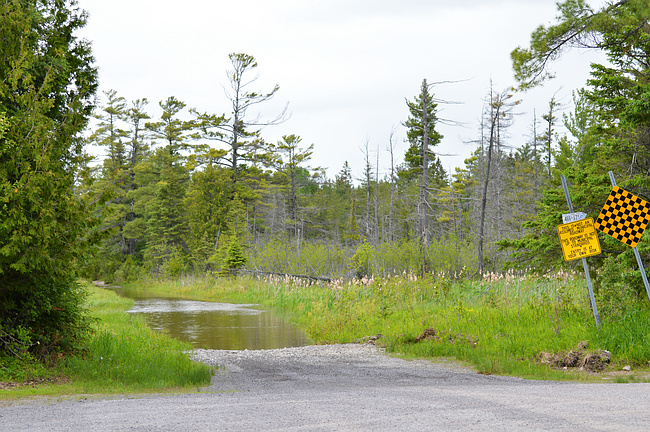
The sign reads, "this roadway is not up to municipal standards." You don't say.
Unsurprisingly, the elusive Ram's Head Ladyslippers eluded me. But Yellow Ladyslippers certainly didn't! I found whole colonies of this beauty, most growing in the shadow of cedars and spruces, a few out in the open.
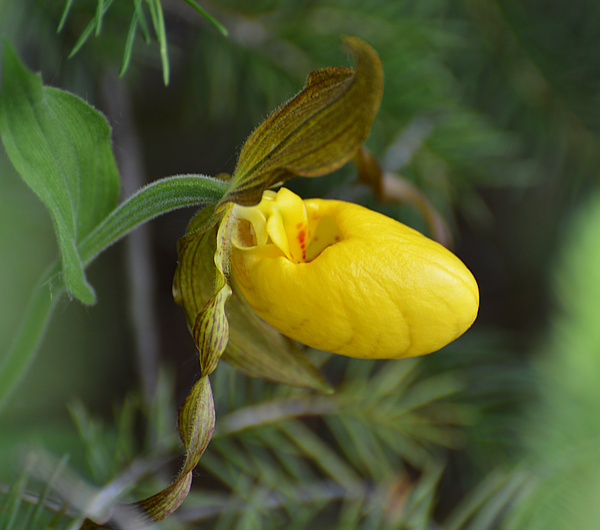
Sharing habitat with some of the Yellow Ladyslippers were patches of the most intensely blue violets I had ever seen. I wasn't sure if they were just unusually vivid common violets or something more exotic, but the fact that they hung close with the ladyslippers seemed significant. On a trip with my husband, he looked them up in our Peterson's and determined that they were indeed something a little more exotic: Northern Bog Violet. Unfortunately, my photos failed to do justice to that otherworldly blue, so I deleted them.
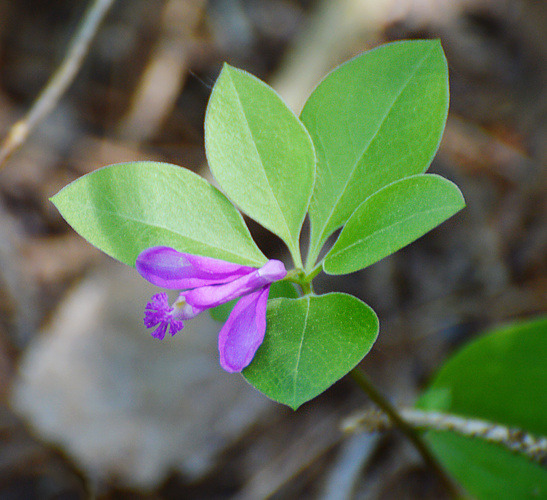
Fringed Polygala
These little beauties brightened the forest floor beneath a stand of pine trees. When I saw them I was sure I had found my second orchid of the day. They were even there in one of the orchid color plates in Peterson's, but the label said "not an orchid." D'oh! They're also known as Gaywings. The habitat I found them in (coniferous, moist) was very classic.
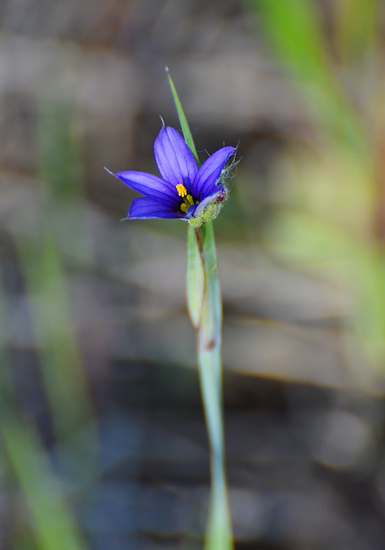
Blue-Eyed Grass
A characteristic wildflower of prairie-like habitats, this grows in the more open parts of the alvar. Though it looks like grass topped with tiny blue blossoms, it's actually part of the iris family.
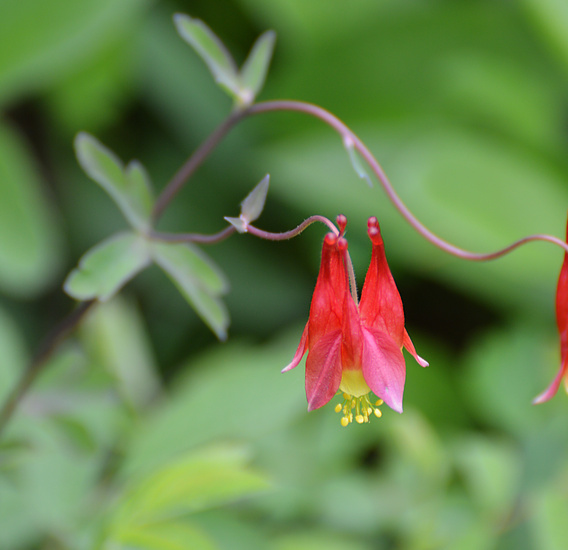
Wild Columbine
Always a pretty flower, but this was the most vivid columbine blossom I'd ever seen.
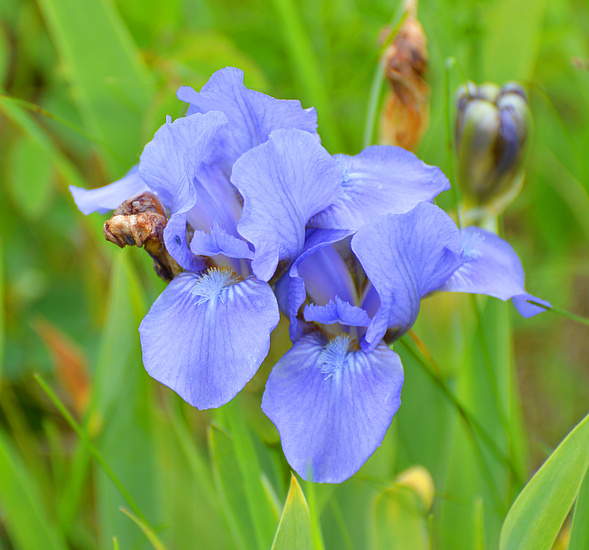
These looked like Blue Flag irises, but very short and growing in a drier area than I'd expect for Blue Flag, and the features aren't quite right (there should be more yellow at the base of the petals, for instance.) Possibilities I've considered are Crested Dwarf Iris, Vernal Iris, a variation on Blue Flag, or even a garden escape (as it was growing near March Road.) But nothing seems quite right. Please let me know if you have an idea!

I found a few of these strange but pretty flowers, usually creeping underneath piles of deadwood or other dense brush and being tough to photograph. Trumpet Honeysuckle, I think, but I have some misgivings with the ID. The colors don't quite match, and Trumpet Honeysuckle is supposed to be a climbing vine, not creeping. Again, let me know if you have any input.
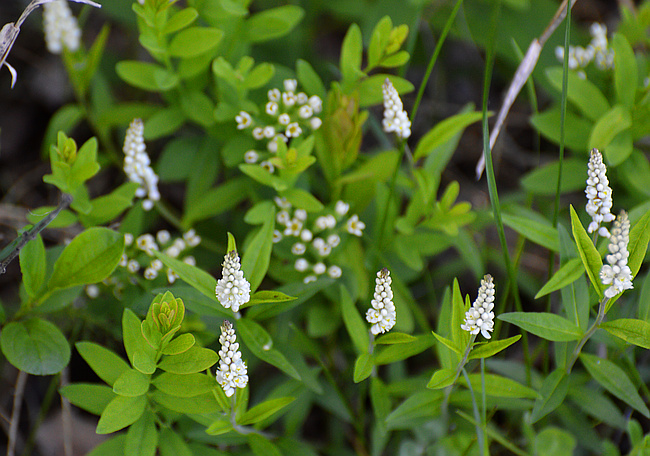
Seneca Snakeroot
These conelike white clusters seemed unfamiliar to me, so I took a few pictures and looked them up when I got home. Seneca Snakeroot is a rather uncommon wildflower but characteristic of the Burnt Lands. It prefers calcareous (limestone-based) conditions such as those on an alvar. The name Seneca Snakeroot honors the Seneca people who once used it to treat snake bites. It is still in use medicinally today in herbal remedies and cough medicines (it's an expectorant) and is even cultivated as a crop in some areas.
June 23rd, 2017

"The Three Sisters", yellow ladyslippers in bloom on the Burnt Lands alvar
In early June I made several trips out to the Burnt Lands near Almonte, hunting for orchids. For being a provincial park, this area is surprisingly unknown and unmarked, but it is an ecological gem. Last August I found it teeming with Aphrodite Fritillaries and other interesting insects (1, 2). I promised myself that for 2017, I'd go earlier in the year and seek out the elusive Ram's Head Ladyslipper, one of the rarest orchids in North America.
Last summer my usual access to the park was via Ramsey Concession 12. The maintained road ends and turns into a dirt road through the park. I found it quite hikable with only the occasional shallow puddle. However, last summer conditions were droughtlike, and conditions this year have been anything but, not to mention it's June, not August. The dirt road was so flooded (by the adjacent wetland) that even my tall rubber boots were not enough to get through it. Fortunately, there's another access at March Road and Golden Line that requires only a good set of water-resistant hiking boots.

The sign reads, "this roadway is not up to municipal standards." You don't say.
Unsurprisingly, the elusive Ram's Head Ladyslippers eluded me. But Yellow Ladyslippers certainly didn't! I found whole colonies of this beauty, most growing in the shadow of cedars and spruces, a few out in the open.

Sharing habitat with some of the Yellow Ladyslippers were patches of the most intensely blue violets I had ever seen. I wasn't sure if they were just unusually vivid common violets or something more exotic, but the fact that they hung close with the ladyslippers seemed significant. On a trip with my husband, he looked them up in our Peterson's and determined that they were indeed something a little more exotic: Northern Bog Violet. Unfortunately, my photos failed to do justice to that otherworldly blue, so I deleted them.

Fringed Polygala
These little beauties brightened the forest floor beneath a stand of pine trees. When I saw them I was sure I had found my second orchid of the day. They were even there in one of the orchid color plates in Peterson's, but the label said "not an orchid." D'oh! They're also known as Gaywings. The habitat I found them in (coniferous, moist) was very classic.

Blue-Eyed Grass
A characteristic wildflower of prairie-like habitats, this grows in the more open parts of the alvar. Though it looks like grass topped with tiny blue blossoms, it's actually part of the iris family.

Wild Columbine
Always a pretty flower, but this was the most vivid columbine blossom I'd ever seen.

These looked like Blue Flag irises, but very short and growing in a drier area than I'd expect for Blue Flag, and the features aren't quite right (there should be more yellow at the base of the petals, for instance.) Possibilities I've considered are Crested Dwarf Iris, Vernal Iris, a variation on Blue Flag, or even a garden escape (as it was growing near March Road.) But nothing seems quite right. Please let me know if you have an idea!

I found a few of these strange but pretty flowers, usually creeping underneath piles of deadwood or other dense brush and being tough to photograph. Trumpet Honeysuckle, I think, but I have some misgivings with the ID. The colors don't quite match, and Trumpet Honeysuckle is supposed to be a climbing vine, not creeping. Again, let me know if you have any input.

Seneca Snakeroot
These conelike white clusters seemed unfamiliar to me, so I took a few pictures and looked them up when I got home. Seneca Snakeroot is a rather uncommon wildflower but characteristic of the Burnt Lands. It prefers calcareous (limestone-based) conditions such as those on an alvar. The name Seneca Snakeroot honors the Seneca people who once used it to treat snake bites. It is still in use medicinally today in herbal remedies and cough medicines (it's an expectorant) and is even cultivated as a crop in some areas.
| ← | → |

Mike
June 24th, 2017 at 9:57 am
Definitely an interesting area, and relatively easy to explore if one has water-resistant footwear!
Also, nice catches of the colors on many of those!
mustangsallie
June 25th, 2017 at 12:34 pm
What a wealth of colorful wildflowers. Great close-ups!
dagibbs
June 25th, 2017 at 1:21 pm
So, do you list and collect flowers/plants the way you do birds?
Lovely photos.
Suzanne
June 25th, 2017 at 1:36 pm
Thanks! I count them more casually. I actually don't have a list of wildflowers in my records, but I'm aware when I find a new one that I've never seen before. How much I celebrate a new wildflower kind of depends on how pretty it is :-) (Unlike with birds where I can get excited even about little brown jobbies.)
dagibbs
June 25th, 2017 at 1:47 pm
I record things like games-played and climbs-climbed, so was curious as to what you recorded. I assumed you kept a pretty good record of bird sightings. :)